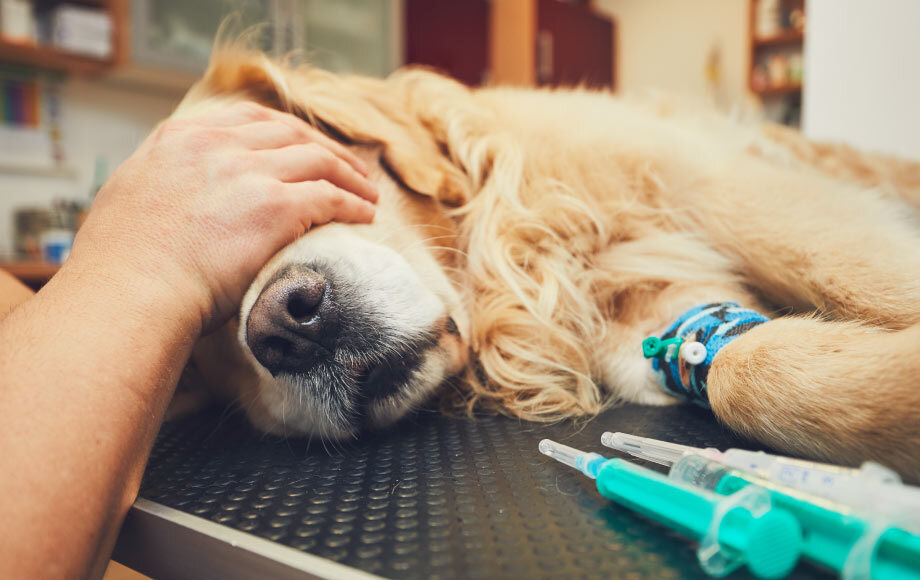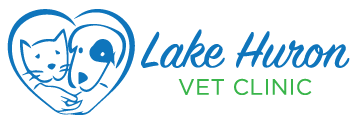
Gastropexy
Gastropexy for Dogs: Preventing Bloat (Gastric Dilation Volvulus – GDV)
What Is Gastric Dilation Volvulus?
Gastric Dilation Volvulus (GDV), also known as “Bloat” or “stomach torsion,” is a life-threatening condition affecting large, deep-chested dogs. GDV happens when the pylorus (the lower part of the stomach) flips or twists, cutting off blood supply and blocking anything from entering or exiting the stomach. Without prompt surgical intervention, GDV can be fatal—often within 5 hours of onset.
At Lake Huron Veterinary Clinic, we believe in educating dog owners about GDV and offer gastropexy as the most effective preventative measure to safeguard your pet from this dangerous condition.
What Causes Gastric Dilation Volvulus?
While the exact cause of GDV isn’t fully understood, several factors can raise the risk:
- Large, deep-chested breeds: Dogs like Great Danes, Weimaraners, Boxers, and German Shepherds are more prone due to their anatomy.
- Eating habits: Dogs that eat rapidly or consume a single large meal daily are at greater risk.
- Exercise: Intense exercise right after eating can trigger stomach torsion.
- Age: Middle-aged and older dogs are more likely to develop GDV.
- Genetics: Some dogs inherit a higher risk for bloat.
What Are the Signs of GDV?
Recognizing the early signs of bloat is crucial. Symptoms may include:
- A swollen or distended abdomen
- Restlessness or pacing
- Vomiting or dry heaving
- Excessive panting or drooling
- Signs of discomfort or pain
If you observe any of these symptoms, seek immediate veterinary care.
How Can GDV Be Prevented?
The most reliable way to prevent GDV is through gastropexy, a surgery that attaches the stomach to the body wall, preventing it from twisting. At Lake Huron Veterinary Clinic, we offer laparoscopic gastropexy, a minimally invasive procedure done through a small 1 cm incision. This method results in less post-operative pain and faster recovery compared to traditional surgery.
While the best time for gastropexy is during a spay or neuter, it can be performed at any age, either on its own or with other procedures. Laparoscopic gastropexy is especially helpful for high-risk breeds or dogs with a family history of bloat.
Other Preventative Measures
In addition to gastropexy, you can reduce your dog’s risk by:
- Feeding smaller, frequent meals rather than one large meal
- Using a slow-feed bowl to slow down rapid eating
- Avoiding feeding just before or after exercise
- Monitoring water intake and avoiding excessive drinking
- Considering prophylactic gastropexy for high-risk breeds, even if no symptoms have appeared
What to Expect After Gastropexy
Gastropexy is a safe procedure, whether done during spay/neuter or separately. After a laparoscopic gastropexy, most dogs recover quickly, returning to their regular activities within 10-14 days. Our team at Lake Huron Veterinary Clinic will provide clear aftercare instructions to ensure your dog’s comfort and smooth recovery.
Why Choose Lake Huron Veterinary Clinic for Gastropexy?
At Lake Huron Veterinary Clinic we use the latest surgical techniques to ensure your pet receives the best possible care. Our laparoscopic gastropexy offers:
- Minimally invasive surgery with smaller incisions and reduced pain
- Faster recovery time
- Lower risk of complications
- Peace of mind knowing your pet is protected from this life-threatening condition
Contact Us for More Information
To learn more about gastropexy or to schedule a consultation, contact Lake Huron Veterinary Clinic at 810-985-8300. We’re here to answer any questions and help keep your dog healthy and safe.
